What are you looking for at Aqrani library?
-
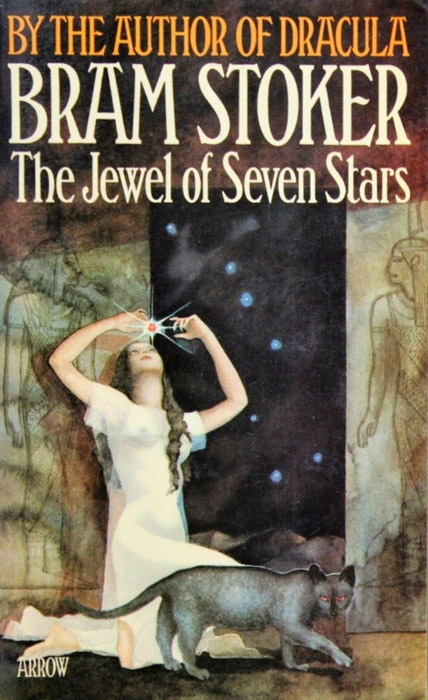
The Jewel of Seven Stars
Malcolm Ross, a young barrister, is awakened in the middle of the night and summoned to the house of famous Egyptologist Abel Trelawny at the request of his daughter, Margaret, with whom Malcolm is enamored. Once Malcolm arrives at the house, he meets Margaret, Superintendent Dolan, and Doctor Winchester, and learns why he has been called: Margaret, hearing strange noises from her father’s bedroom, woke to find him unconscious and bloodied on the floor of his room, under some sort of trance. Margaret reveals that her father had left a letter of strange instructions in the event of his incapacitation, stating that his body should not be removed from his room and must be watched at all times until he wakes up. The room is filled with Egyptian relics, and Malcolm notices that the "mummy smell" has an effect on those in the room. A large mummy cat in the room disturbs Margaret’s cat, Silvio, and the doctor suspects Silvio is guilty of the scratch marks on Trelawny’s arm.
-
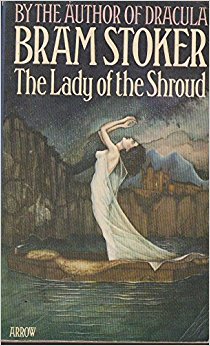
The lady of the shroud
Rupert Saint Leger inherits his uncle's estate worth more than one million pounds, on condition that he live for a year in his uncle's castle in the Land of the Blue Mountains on the Dalmatian coast. There Rupert tries to win the trust of the conservative mountaineer population by using his fortune to buy them modern arms (from a South American country that has unexpectedly found itself at peace) for their fight against Turkish invasion (the story was written shortly before the Balkan Wars). One wet night, he is visited in his room in the castle by a pale woman wearing a wet shroud, seeking warmth. He lets her dry herself before his fire, and she flees before morning. She visits several more times, all at night, and they hardly speak, but he falls in love with her, despite thinking she is a vampire. He visits the local church and finds her in a glass-topped stone coffin in the crypt. Despite misgivings he declares his love, be she living or undead, and she arranges the marriage in an Orthodox ceremony conducted by candlelight in the church one night, although he still does not know her name, and she says she must still live alone in the crypt for the present. Soon afterwards, she is kidnapped by a forward party of Turkish troops, and he learns that she, Teuta, is not undead, but the living daughter of the local Voivode, who is currently returning from a visit to America. She had fallen into a trance, and was declared dead, but then revived, and the local leaders and clergy spread a story of vampirism which was more acceptable, after the (mistaken) news of her death, to the uneducated locals than the truth. Living up to this story, she had spent her days in the coffin in the crypt, but during heavy rain when the crypt flooded, came out seeking warmth in the castle in which she had grown up, and knew all the secret entrances, and hence her meetings with Rupert behind locked gates.
-
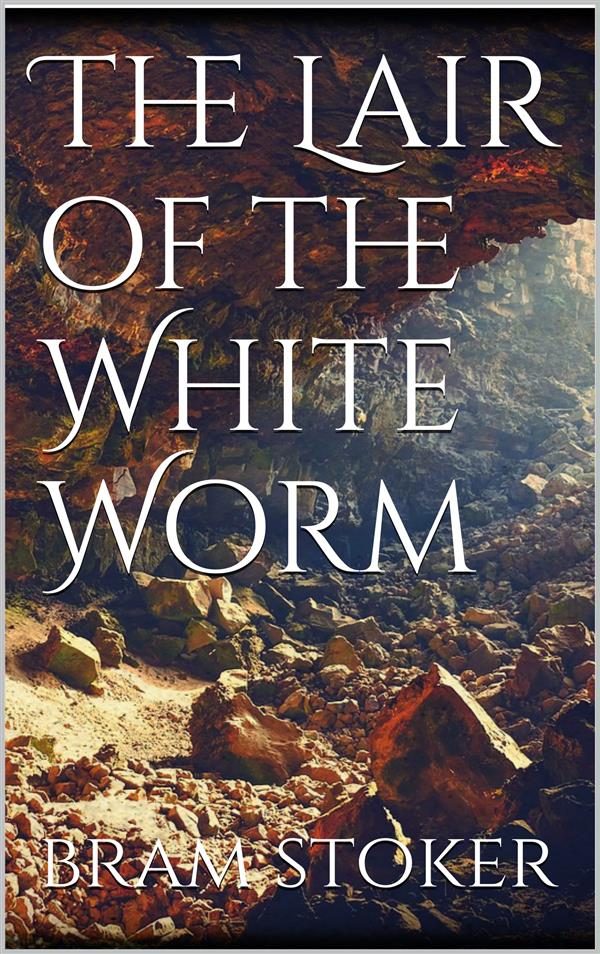
The Lair Of The White Wor...
Set in Mercia, a small part of the English county of Derbyshire, the novel focuses on the events experienced by Adam Salton in the town he gradually discovers to be host to mysterious and inexplicable occurrences, which are further intensified with its equally eccentric residents. Exploring topics including mesmerism, occultism, and supernatural forces, Stoker’s piece depicts all the essential elements of a thrilling horror story. The horror novel gets under way with the introduction of Adam Salton, a young man originally from Australia, who receives word from his great-uncle Richard Salton inviting him to live with him on his estate in the hopes of establishing a relationship between the two. Subsequently, Adam travels to the estate of his newly discovered relation and seems to get off to a good start with his great-uncle, who learns of his ardent interest in ancient history and introduces him to Nathaniel, both a friend and archeologist. Additionally, the town welcomes Edgar Caswell, another resident of Mercia who has arrived after a long period of absence. Caswell generates much interest from fellow locals given his title as heir to a great estate known as Castra Regis. Especially intrigued by Caswell’s arrival seems to be local Lady Arabella March, a beautiful yet frigid character who seems to have her eye on the wealthy new heir. Overwhelmed by the suspicious events surfacing in front of their very eyes, Adam and Nathaniel must take matters into their own hands as they face an antediluvian supernatural entity threatening the residents of Mercia.
-
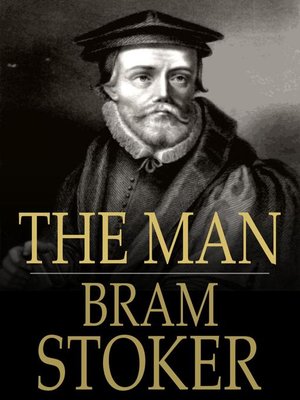
The man
Squire Stephen Norman is lord of the manor in Normanstead. He marries Margaret Rowly, younger sister of his friend Rowly (squire of the neighboring town). Desirous of an heir, Norman and Margaret have a baby girl and Margaret dies shortly after the birth. Norman promises her that he will love their daughter as much as he would have loved a son, and Margaret asks him to name the girl Stephen. Squire Norman his daughter Stephen as a tomboy. Margaret's spinster aunt Laetitia Rowly moves in to help care for Stephen, who is dominant, assertive and free-thinking. When Stephen is six, Norman's visiting college friend Dr. Wolf tells her about his 11-year-old son Harold. The girl asks Wolf to bring Harold on a future visit, and the children become friends. Two years later, Dr. Wolf dies of pneumonia and Squire Norman promises to raise Harold as if he were his own son. Stephen and Harold visit the graveyard of the Church of St. Stephen in Normanstead (where all her ancestors are buried), and find the crypt unlocked. Stephen and another young boy, Leonard Everard, explore the crypt. Harold finds Leonard running out of the crypt and Stephen unconscious on the floor in front of a coffin. Leonard tells her that he carried her out of the crypt, and she begins to admire him. Harold goes to Cambridge University and begins to fall in love with Stephen, who admires Leonard (though he is selfish and uninterested in her). She tells her appalled aunt that a woman should be able to ask a man to marry her. After graduation, Harold moves back to Squire Norman's estate. He and Norman are involved in a phaeton accident, in which Norman is fatally injured. Before he dies, he tells Harold to look after Stephen and gives him his blessing to marry her if she wishes. Stephen decides to propose to Leonard, asking him in a letter to meet her. Leonard refuses her proposal, and she is humiliated. He tells an incredulous, upset Harold about Stephen's proposal, and Harold proposes to her the next morning. Stephen, aware that Harold knows about her rejected proposal, becomes angry and tells him to leave. When she tells Leonard that in exchange for his silence she will pay his debts, he realizes the advantages of marrying her. He proposes, and she rejects him.
-
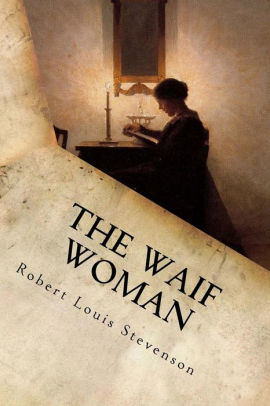
The Waif Woman
Robert Stevenson's "The Waif Woman" was unpublished at the time of his death; it was found among his papers. Writing of the fables which Stevenson began before he had left England and "attacked again, and from time to time added to their number" in 1893, Mr. Balfour (author of the Life of Stevenson) says: "The reference to Odin [Fable XVII] perhaps is due to his reading of the Sagas, which led him to attempt a tal in the same style, called 'The Waif Woman.'"
-
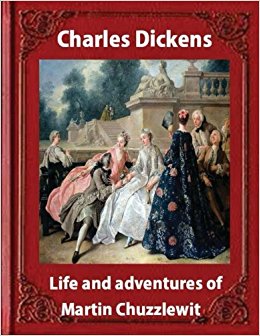
Life and Adventures of Ma...
Dickens thought it was “in a hundred points, immeasurably the best” of his stories. Yet it was also one of his greatest flops. Compared to his other novels, The Life and Adventures of Martin Chuzzlewit was a dismal failure in terms of sales and the main reason for Dickens falling out with his long term publisher Chapman & Hall. They invoked a penalty clause and demanded that he pay back a portion of the advance which he refused. Martin Chuzzlewit was also dimly received in Dickens friendly America. Its vitriolic satire of American customs and manners was met with astonished rage on the other side of the Atlantic and Dickens began to receive masses of hate mail from offended Americans. The Life and Adventures of Martin Chuzzlewit, His Relatives, Friends and Enemies, comprising All His Wills and Ways... The Whole Forming a Complete Key to the House of Chuzzlewit is the original title, in typical elaborate Dickensian overkill. In fact, in his almost apologetic preface to the first edition, he justifies it. He declares, “What is exaggeration to one class of minds and perceptions is plain truth to another...” and goes on to testify that some of the events and characters in his works are based on reality and not wholly imagined.
-
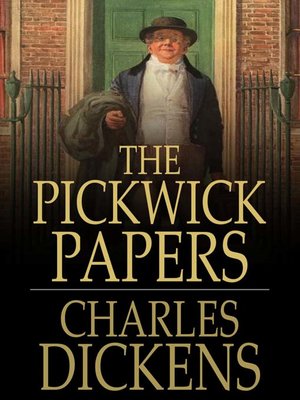
Pickwick Papers
A sportsman who doesn't hunt; a poet who doesn't write; a lover with no one to love; all three are devoted to their cheerful and benevolent leader, Mr. Pickwick. Join him and his friends, Winkle, Snodgrass, and Tupman, as they tour the country in search of adventures, knowledge, and stories. Along the way, they have their share of mishaps, and meet plenty of interesting characters, both the good and the not so good. (Mr. Pickwick's dedicated manservant, Sam Weller, is a scene-stealer sure to delight just about everybody.) You may shed a few tears along the way, but usually of the pleasant sort. This is a mostly lighthearted and humorous tale, with a number of subplots woven in, in Dickens’ incomparable style.
-
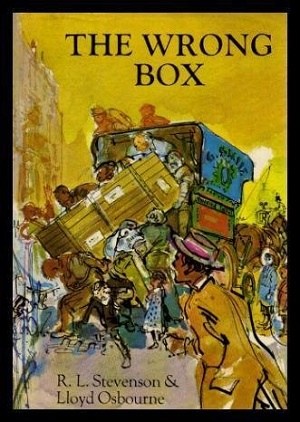
Wrong Box
The Wrong Box is a comedy about the ending of a tontine (a tontine is an arrangement whereby a number of young people subscribe to a fund which is then closed and invested until all but one of the subscribers have died. That last subscriber then receives the whole of the proceeds). The story involves the last two such survivors and their relations, a train crash, missing uncles, surplus dead bodies and innocent bystanders. A farce really.
-
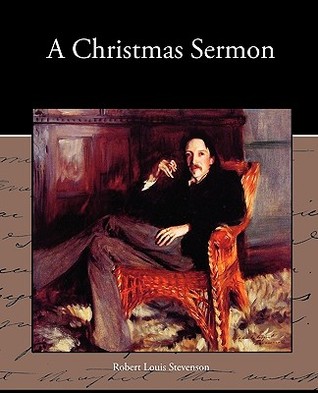
A Christmas Sermon
A Christmas Sermon by Robert Louis Stevenson written while he convalesced from a lung ailment at Lake Sarnac in the winter of 1887. In the short text he meditates on the questions of death, morality and man’s main task in life which he concludes is “To be honest, to be kind — to earn a little and to spend a little less, to make upon the whole a family happier for his presence.” The piece was to be published in Scribner’s magazine the following December. This pamphlet edition is from 1900, published 6 years after Stevenson’s death at the age of just 44.
-
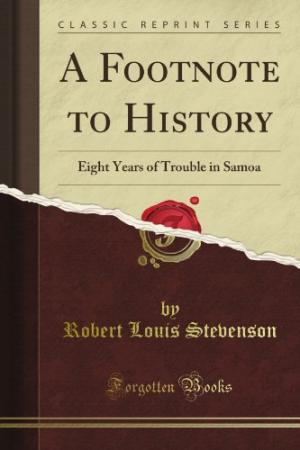
A Footnote History
A Footnote to History: Eight Years of Trouble in Samoa is an 1892 historical non-fiction work by Robert Louis Stevenson describing the contemporary Samoan Civil War. Robert Louis Stevenson arrived in Samoa in 1889 and built a house at Vailima. He quickly became passionately interested, and involved, in the attendant political machinations. These involved the three colonial powers battling for control of Samoa – America, Germany and Britain – and the indigenous factions struggling to preserve their ancient political system. The book covers the period from 1882 to 1892. The book served as such a stinging protest against existing conditions that it resulted in the recall of two officials, and Stevenson for a time feared that it would result in his own deportation. When things had finally blown over he wrote to Sidney Colvin, who came from a family of distinguished colonial administrators, "I used to think meanly of the plumber; but how he shines beside the politician!"